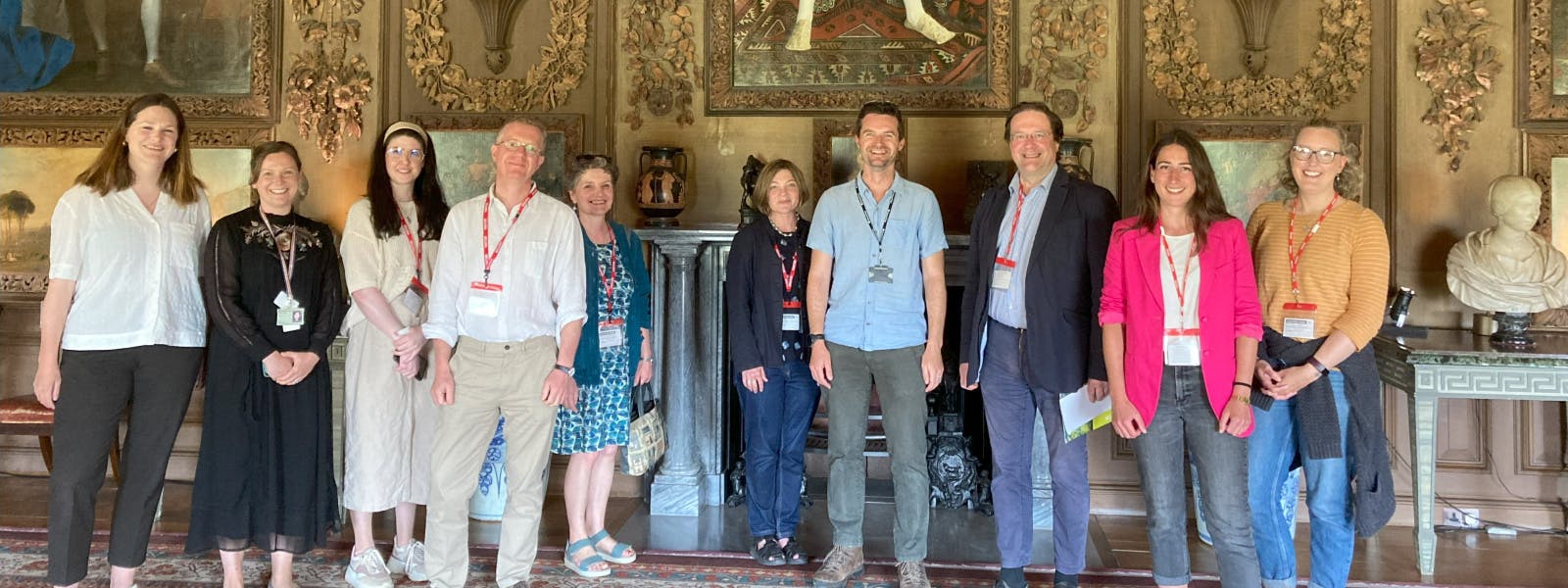
About Henry VIII on Tour
Henry VIII on Tour is a major three-year project funded by the Arts and Humanities Research Council (AHRC) which began in November 2022 and runs until October 2025. Led by Professor Anthony Musson (HRP), the project brings together a cross-disciplinary team to reconceptualise Henry VIII's progresses through studying archival sources, architecture, music, and material culture.
By mapping all known progress venues and identifying changes throughout Henry’s reign, the project will establish the first full itinerary for Henry VIII, significantly enhancing historians' understanding of royal progresses and their impact on 16th century political and religious culture.
Part of this project also involves reassessing the role and agency of Henry’s queens on royal journeys and recreating their own itineraries wherever possible. Overall, the project explores the hidden histories of understudied groups and communities and demonstrates how progresses themselves fostered the circulation of ideas, news, skills, architectural styles, and music across England.
Project website
Find out more on our dedicated project website.
Visit the Henry on Tour websiteProject aims
The key aims of the project are to:
- Transform understanding of Henry VIII, his queens, and his reign by undertaking cross-disciplinary research into the impact and significance of royal progresses and their political, social, material, and cultural legacy.
- Re-interpret the history of royal progresses by using innovative archival research to examine the varied experience of local communities, and by exploring the hidden histories of women, artisans, musicians, and those who worked for the royal household.
- Promote understanding of 'lost' historic buildings and landscapes significant to Henry VIII's reign through community archaeology and digital visualisations of key royal palaces, country houses and monastic sites.
- Undertake an evaluative case study of the repertoire of the chapel royal on progress by performing pre- and post-Reformation Tudor music in original progress venues.
- Enable educators to use the Tudors across the curriculum by creating their own original learning resources.
- Reconnect disparate heritage sites formerly owned or visited by Henry VIII by creating and leading a joined-up network of organisations.

Research questions
- How did visibility function in Henry VIII’s reign: where was he at any given moment, and how can we use different kinds of evidence to reconstruct his progress itinerary?
- What were the main logistical factors in implementing royal progresses?
- How was the performance of kingship and queenship shaped by progresses, and to what extent were Henry VIII’s queens independent actors when the royal court was on tour?
- How were the environment and local communities impacted by Henry VIII’s progresses?
- How can heritage organisations use the Tudor legacy to engage with 21st-century audiences?
Outputs and findings
Digital outputs
The project team is working with the University of York’s Heritage360 digital team to reconstruct:
- A 3D visualisation of the former St Mary’s Abbey, York, which post-Reformation was turned into a palace (now the King’s Manor) for Henry VIII and Catherine Howard to stay in during their 1541 northern progress.
- 2D and 3D visualisations of ‘lost’ or problematic venues (at Petworth, Lyddington, and Acton Court) to make them accessible for visitors unable to access the sites in person.
- An interactive webmap and app for onsite visitors wanting to create their own progress trails, aided by a digital tour guide, filmed at three of our venues.

Community engagement
The project combines physical archaeological digs and musical experiments to engage specific communities with the heritage sites. This will involve:
- Opportunities for volunteers (individuals and families) to participate in in a three-week community archaeology dig at Petworth House in July 2024 with the aim of ascertaining the dimensions of the former North-Wing and locate Henry’s grandstand/banqueting house.
- Engaging with local choirs in performances of Tudor music in their original settings, including a liturgical enactment at Christchurch Priory in Dorsetand Berkeley Castle in Gloucestershire.
- Staging a ‘Civic Welcome’ at Exeter Cathedral.
- Working with students from the Royal School of Needlework and Wimbledon College of Arts, who are reproducing clothing and textiles for an installation at Powderham Castle and West Horsley Place.
- Ensemble Pro Victoria will perform concerts at Christchurch Priory, West Horsely Place, Berkeley Castle and New College, Oxford and produce a recording of music for Henry VIII’s progresses for Delphian Records, some pieces of which will be world premieres.
- The choir of HM Chapel Royal, Hampton Court will also stage a service of Vespers for St Nicholastide in December 2024.
Education
The project will deliver outputs with schools and educators, including:
- A two-day residential course held at Hampton Court in January 2025 as part of the Historical Association’s Teaching Fellowship Programme.
- A national schools’ event at Hampton Court Palace in June 2025.
- An early career researchers' day at the Society of Antiquaries of London’s Burlington House in October 2024.

Presentations
In July 2023, the team gave tours around the King’s Manor and presentations to the cast, crew, and audience members of a theatrical adaptation of CJ Sansom’s Sovereign (a detective story based on Henry VIII’s 1541 progress to York) performed at the King’s Manor.
Research team
Principal Investigator: Professor Anthony Musson (Historic Royal Palaces)
Co-Investigators: Dr John Cooper (University of York); Professor Kate Giles (University of York); Professor Magnus Williamson (Newcastle University)
Post-doctoral Research Assistant: Dr Kirsty Wright (Historic Royal Palaces)
Impact & Outreach Co-ordinator: Keely Hayes-Davies (University of York)
Technical Team: Dr Louise Hampson, Patrick Gibbs, James Osborn
(Centre for the Study of Christianity and Culture/Heritage360)
Project partners
This project is funded by the AHRC, with additional support from the South Downs National Park Authority and the Society of Antiquaries.

South Downs National Park


